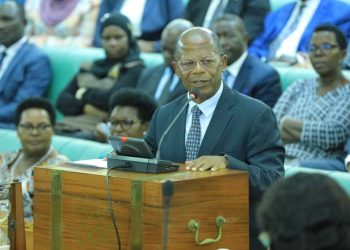In a move to address violence against women and girls, the Uganda Police Force has set up special units where cases of gender-based violence (GBV) will be reported and handled. The deputy Inspector General of Police (IGP), Brig. Sabiiti Muzeeyi, said the units have been set up at every Police station across the country.
He said the units would be manned by trained personnel, who will record and investigate all the cases to have the culprits face the law. Sabiiti, who was officiating at the Police women’s conference to commemorate the 16 days of activism 2018 held at Silver Springs Hotel, Bugolobi, Kampala, observed that many cases were not recorded because victims had nowhere to report, yet culprits continue with their acts.
“This unit comes withresource allocations and trained personnel to manage the cases as well as offerpreventive, promotional and rehabilitative services in all the districts in thecountry,” he said.
He said the specialised unit would have the operational autonomy to expedite cases. Sabiiti said the annual Police crime and traffic report indicated a rise in the gander-based violence cases from 13,132 in 2016 to 15,325 in 2017.
On the theme promoting gender equity at workplace in the Police, Sabiiti said they were committed to breaking the silence and increasing awareness on the fight of genderbased violence. Brig. Sabiiti also said they had strengthened Police capacity in preventing and responding to GBV and child abuse by the criminal justice system with a vision of creating a society free of GBV and child abuse.
Acting commissioner Women Affairs department Easter Akwango pledged to enhance the capacity of women officers in the force to not only prevent the occurrence of GBV, but also provide response services to those who need the support.
GBV at the workplace
Akwango said often, women do not have the power to negotiate or are afraid to lose their source of income and are increasingly reluctant to denounce acts of violence at their workplace.
“GBV exists in workplaces mainly because women are oftentreated as second class citizens with lesser value and privileges, leading tolower paying and lower status jobs with little decision-making or bargainingpower over the terms and conditions of their labour,” she said.
Josephine Kamisya, the senior programme officer Centre for Domestic Violence Prevention, argued that lack of bargaining power and labour policies leave many workers, particularly women, unprotected and without recourse in the face of gender-based discrimination and workplace violence.
“Women who have been victims of violence are less likely toaccess preventive and injury-related healthcare than non-abused women,” shesaid.
Kamisya said violence against women at workplaces must end because it lowers productivity of the employees who are experiencing violence and also violates women’s right to a life in safety































































